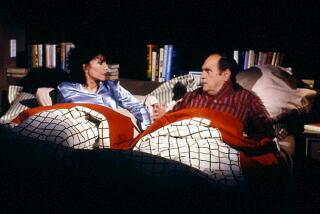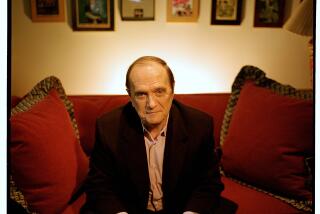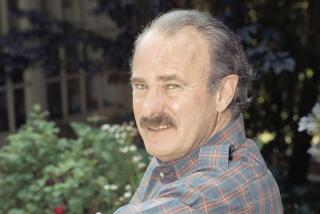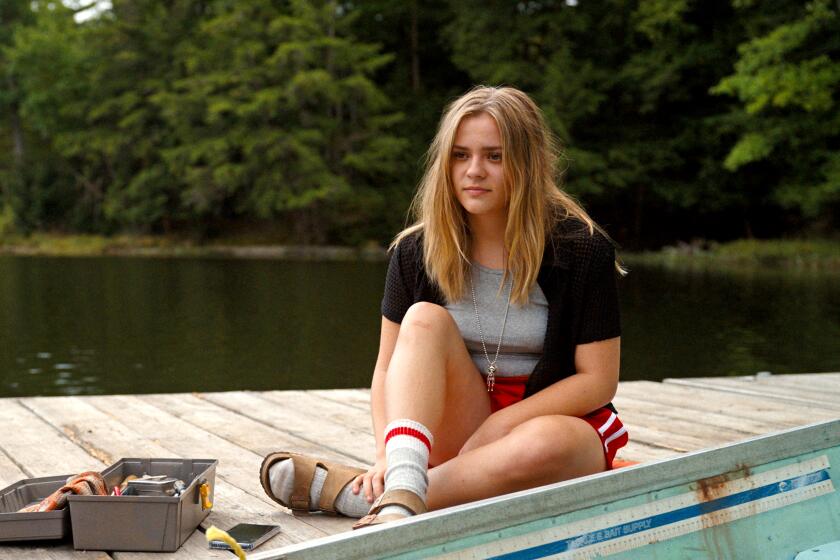Bill Nighy pretty much lived this role
Bill Nighy’s journey to mid-’60s England began in, of all places, mid-’60s England. As a teen, he left home for Paris to write, came back unwritten, then became an actor, later to play a key (imaginary) figure in the very music that transformed him as a youth. But let’s start with Bill the Mod.
“Mods loved black American music: Stax, Atlantic and Tamla Motown,” says the actor in a quiet, cultured voice at a table at L’Ermitage. “You had a half-inch all-over haircut. You wore Ravel loafers and trousers of the cigarette type but slightly too short, and I regret to say this, and I’m embarrassed and ashamed, but with . . . colored socks.”
The Nighy of Now, looking sensibly chic in a black suit and, one presumes, black socks, has teamed with writer-director Richard Curtis for a third go-round, this time for “Pirate Radio.” The new comedy concerns the British empire’s virtual radio blackout in the ‘60s of the Stones, the Who and their ilk, birthing a rebel alliance of offshore rock ‘n’ roll stations, many on ships anchored in the international waters of the North Sea.
“They were still playing your parents’ music, which was basically people in evening dress, standing very still, singing about the stars. Within about three years, you had Jimi Hendrix burning his guitar,” Nighy says, still relishing the revolution.
Nighy’s character Quentin is the owner of one such rocking boat, King Bee to a hive of DJs played by the likes of Philip Seymour Hoffman, Rhys Ifans and Rhys Darby (the last known for “Flight of the Conchords”).
“I’m not famous for my back story investigations; I’m lucky that I work with good writers and it’s usually in the script. But we speculated, Richard and I, that with a name like Quentin, if you’re English, unless your parents are deeply eccentric, it probably means you are what they used to call ‘high born.’ In other words, from an old, established British family. And he’s almost certainly the black sheep -- just wearing those clothes would isolate him. We speculated perhaps he stole a Canaletto or a Rembrandt from the family’s stately home to buy the boat. He’s got a few quid from somewhere. He wouldn’t think of it as stealing; he’d think of it as part of his heritage.”
And with that, he’d have launched his outlaw station. “Twenty-two million people tuned in every day. So that was basically everyone under 30. And the government did this cool thing and made it illegal. You got outlaw status just by tuning in.”
But back to the Nighy of Then, the 14-year-old Mod who longed to write like Ernest Hemingway, a Stax/Volt devotee who happened upon Bob Dylan’s first album and, over the next couple of years, thought he found the answer (my friend):
“I had no tradition with folk music, but for some reason, apart from the fact that Dylan is now revealed as a genius and he transcends all genres and forms, he blew my mind, as we used to say in the old days. And I left home pretty much as the result of that. I threw my suitcase out the window. I could have used the front door but I didn’t want to have that conversation with my dad. I was 16. I was an average mess. I didn’t have a useful thought in my head, really. I’d read a lot of books.
“And I went to Paris for the other half of my enthusiasm, which was to be like Ernest and write in short, beautiful sentences that would get me a girl.”
He and the theoretical “future Mrs. Nighy” did not rendezvous in Paris. So he went back to England, where he tried several jobs until happening into acting.
The new film, says Nighy, is really about “decency and friendship. Richard Curtis is a believer. When a movie is called ‘searingly honest,’ it’s almost invariably grim and demonstrates how bad things can get. Richard likes to try to make a searingly honest movie that tells you how good things can be.
“And it’s a shameless excuse to play all his favorite records from his favorite year.”
Nighy of Now is far from nostalgic about the period, not the type to cast longing looks back.
“I do love the scene when Philip Seymour has a speech about how people think in retrospect, ‘Those were the days of my life.’ And he says, ‘These are the days of my life.’ I love that notion,” he says.
“I’m working on the idea that the celebrations can already begin. Instead of going into the past, looking for clues, or wandering into the future, unaccompanied, just trying to remain in the day and experience it fully.”
--
--
(BEGIN TEXT OF INFOBOX)
Where you’ve seen him
Among the nearly 100 chances so far to watch Bill Nighy: nervously conspiring with Tom Cruise in “Valkyrie,” lording it over Kate Beckinsale and the other sexy vampires in the “Underworld” movies, broguing it up under tentacles in the “Pirates of the Caribbean” sequels, and rocking incorrigibly in Richard Curtis’ “Love Actually.” He points to his role in the HBO film “The Girl in the Cafe” (written by Curtis) as a favorite: “It was refreshing to play somebody who was disabled by self-consciousness, reserved to the point of isolation. And to gentle comic effect. I’m interested in those kinds of undercover comedy performances. One of my favorite films of all time is ‘Punch-Drunk Love.’ I wrote ‘Adam Sandler’ at the beginning of my script in ‘Girl in the Cafe.’ ”
-- Michael Ordona
More to Read
Only good movies
Get the Indie Focus newsletter, Mark Olsen's weekly guide to the world of cinema.
You may occasionally receive promotional content from the Los Angeles Times.










